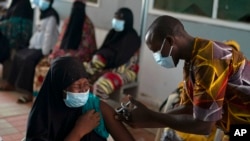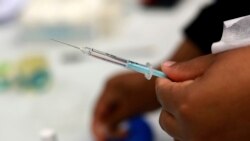Scientists and health advocates in Africa say they’re deeply disappointed by a statement from the U.S. Centers for Disease Control and Prevention about the Johnson & Johnson COVID-19 vaccine.
The CDC last week recommended the Moderna and Pfizer vaccines ahead of the J&J, because of concerns the J&J shot could, in rare cases, cause blood clots, or thrombosis.
The J&J vaccine is one of the most widely used in Africa, because it’s a single dose shot that doesn’t require ultra-cold storage. The South African health department has reassured people that the Johnson & Johnson vaccine is safe.
In a statement, the CDC said it was expressing a "clinical preference" for other vaccines over J&J.
"This updated CDC recommendation follows similar recommendations from other countries, including Canada and the United Kingdom," the CDC said. Still, the CDC said "receiving any vaccine is better than being unvaccinated."
But health authorities in Africa say the CDC recommendation has done “irreparable” harm to their vaccination efforts. They say that the CDC’s linking of the J&J vaccine with rare, but potentially fatal, side effects will spark widespread rejection of the vaccine on the continent, where other vaccines are mostly unavailable.
Fewer than 6% of people in Africa are vaccinated and the World Health Organization describes Africa as "one of the least affected regions in the world."
“I’ve been inundated with calls from people saying, ‘You’re poisoning us’ and ‘We don’t want to take this’ and ‘We’re getting second-hand vaccines; we shouldn’t be getting the J&J, we should only be getting the Pfizer,’” said Barry Jacobson, president of the Southern African Society of Thrombosis. "The CDC, by putting out this statement, has made people scared about taking the J&J booster, and they shouldn’t be."
South Africa’s top epidemiologist, Salim Abdool Karim, maintains J&J’s vaccine is safe.
“If you had to just look at, for example, thrombosis from cases of COVID-19, it’s far higher than from what we see from the vaccine," said Karim, an epidemiologist at South Africa's University of KwaZulu-Natal, who previously advised the South African government on COVID-19. "So there’s no question that this vaccine has a net benefit, even in the face of these side effects.”
The CDC recommendation followed the occurrence of a rare and sometimes fatal blood-clotting issue, called thrombosis with thrombocytopenia syndrome, or TTS, that specifically affected the brain, in people who got the J&J vaccine.
“We’ve seen thrombosis occurring with all the vaccines," Jacobson said. "But the fact of the matter is, if one gets COVID, the risk of thrombosis is massive. It’s a much greater risk of dying of thrombosis from getting COVID than from being vaccinated and getting a thrombosis, where the risk is miniscule compared to the other group.”
Jacobson was on the safety committee that oversaw one of the world’s biggest vaccine trials, when half-a-million health workers in South Africa received the J&J vaccine earlier this year.
That trial, called Sisonke, came to a temporary halt in April when the CDC paused use of the vaccine after six cases of TTS in the U.S. After analyzing more data, the CDC gave the green light to the shot, saying its benefits outweighed its risks.
Why the CDC would now, “out of the blue,” again link the J&J vaccine with this type of thrombosis, Jacobson said, is beyond him.
“The fact that the CDC came out and said that, it shows no insight into what we face in Africa, where there’s a problem with cold-chain storage and the fact that patients can’t get to more than one vaccine,” Jacobson said. “If you look at the true incidence, it’s one in 500,000 to one in a million. You have a higher chance of being struck by lightning."





